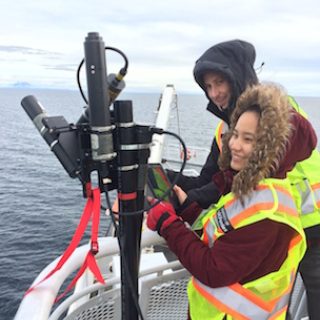Our Stories
Dr. Adam Fenech, Director of the UPEI Climate Lab, is using his $252,000 research funding from Marine Environmental Observation Prediction and Response Network (MEOPAR) and Irving Shipbuilding to investigate the impact of climate change on coastal communities.
“The First Nations of PEI depend strongly on the coast, and on marine resources, especially the fisheries. One of our communities is a small island, and it is crucial for us to develop approaches to deal with a wide range of marine hazards, from storm surges to sea level rise,” said Don MacKenzie, Executive Director of Mi’kmaq Confederacy of P.E.I. (MCPEI). “We enthusiastically look forward to the benefits this project brings to all of our communities.”
Canada’s coastal communities are facing a variety of marine hazards related to climate change, coastal erosion, storm surges, and rising sea levels. These hazards pose serious risk to infrastructure, business, and residential areas.
Dr. Fenech and his team will use detailed coastal sensors mounted on flying drones to capture high-resolution imagery of First Nations communities in the Atlantic Region. This will identify immediate emergency risk assessments to coastal infrastructure, and aid in the development of long-term planning to prepare for, and adapt to, future coastal changes.
Irving Shipbuilding’s funding is pursuant to its Value Proposition obligation under the National Shipbuilding Procurement Strategy, whereby Irving Shipbuilding is committed to spending 0.5% of contract revenues with the aim of creating a sustainable marine industry across Canada.
In total, Irving Shipbuilding is funding nine primary investigators based at six Canadian universities: University of Victoria, University of Ottawa, University of Prince Edward Island, University of Newfoundland, University of Calgary, and Dalhousie University. Together, the projects will involve 48 partner organizations (27 of whom are also contributing financially to the project), creating 57 student and graduate research positions at 12 universities across Canada.
“Ensuring Canada has a sustainable and vibrant marine industry is a priority for Irving Shipbuilding under the National Shipbuilding Procurement Strategy,” said Kevin McCoy, President of Irving Shipbuilding.
“We are proud to work with MEOPAR to support leading edge research across the country that can help achieve this goal.”
Read more about MEOPAR and Irving Shipbuilding’s joint funding of Canadian oceans research.
About MEOPAR
The Marine Environmental Observation Prediction and Response Network (MEOPAR) is strengthening Canada’s ability to anticipate and respond to marine risk. Established in 2012 through the Federal Government of Canada’s Networks of Centres of Excellence Program, MEOPAR funds interdisciplinary academic research, trains highly qualified personnel with expertise in marine risk and response, and connects academic research and technology to national and international partners in government, industry and the private sector. To learn more, please visit www.meopar.ca.
About Irving Shipbuilding Inc
Irving Shipbuilding Inc. is part of the J.D. Irving, Limited Group of companies which includes operations in Agriculture, Construction & Equipment, Consumer Products, Energy, Food, Forestry & Forestry Products, Retail & Distribution and Shipbuilding & Industrial Fabrication. Its primary site is the Halifax Shipyard, with four other locations in the Maritime Provinces. In 2011, Irving Shipbuilding was selected as Canada’s Combatant Shipbuilder under the merit-based National Shipbuilding Procurement Strategy and is in the early stages of a 30-year military shipbuilding program.


